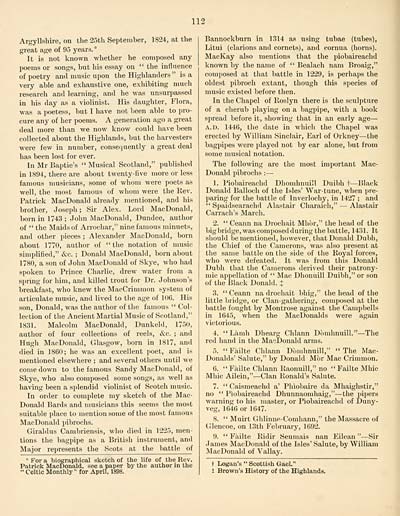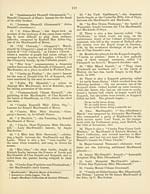Download files
Complete book:
Individual page:
Thumbnail gallery: Grid view | List view

112
Argyllshire, on the 25th September, 1824, at the
great age of 95 years.*
It is not known whether he composed any
poems or songs, but his essay on " the influence
of poetry and music upon the Highlanders " is a
very able and exhaustive one, exhibiting much
research and learning, and he was unsurpassed
in his day as a violinist. His daughter, Flora,
was a poetess, but I have not been able to pro-
cure any of her poems. A generation ago a great
deal more than we now know could have been
collected about the Highlands, but the harvesters
were few in number, consequently a great deal
has been lost for ever.
In Mr Baptie's " Musical Scotland," published
in 1S94, there are about twenty-five more or less
famous musicians, some of whom were poets as
well, the most famous of whom were the Kev.
Patrick MacDonald already mentioned, and his
brother, Joseph ; Sir Alex. Lord MacDonald,
born in 1743 ; John MacDonald, Dundee, author
of " the Maids of Arrochar," nine famous minuets,
and other pieces ; Alexander MacDonald, born
about 1770, author of " the notation of music
simplified," &c. ; Donald MacDonald, born about
1780, a son of John MacDonald of Skye, who had
spoken to Prince Charlie, drew water from a
spring for him, and killed trout for Dr. Johnson's
breakfast, who knew the MacCrimmon system of
articulate music, and lived to the age of 106. His
son, Donald, was the author of the famous " Col-
lection of the Ancient Martial Music of Scotland,"
1831. Malcolm MacDonald, Dunkeld, 1750,
author of four collections of reels, &c. ; and
Hugh MacDonald, Glasgow, born in 1817, and
died in 1860; he was an excellent poet, and is
mentioned elsewhere ; and several others until we
comedown to the famous Sandy MacDonald, of
Skye, who also composed some songs, as well as
having been a splendid violinist of Scotch music.
In order to complete my sketch of the Mac-
Donald Bards and musicians this seems the most
suitable place to mention some of the most famous
MacDonald pibrochs.
Giraldus Cambriensis, who died in 1225, men-
tions the bagpipe as a British instrument, and
Major represents the Scots at the battle of
* For a biographical sketch of the life of the Rev.
Patrick MacDonald, see a paper by the author in the
" Celtic Monthly '■ for April, 1898.
Bannockburn in 1314 as using tubae (tubes),
Litui (clarions and cornets), and cornua (horns).
MacKay also mentions that the piobaireachd
known by the name of " Bealach nam Broaig,"
composed at that battle in 1229, is perhaps the
oldest pibroch extant, though this species of
music existed before then.
In the Chapel of Roslyn there is the sculpture
of a cherub playing on a bagpipe, with a book
spread before it, showing that in an early age —
A.D. 1446, the date in which the Chapel was
erected by William Sinclair, Earl of Orkney — the
bagpipes were played not by ear alone, but from
some musical notation.
The following are the most important Mac-
Donald pibrochs : —
1. Piobaireachd Dhomhnuill Duibh t — Black
Donald Balloch of the Isles' War-tune, when pre-
paring for the battle of Inverlochy, in 1427 ; and
" Spaidsearachd Alastair Charaich," — Alastair
Carrach's March.
2. " Ceann na Drochait Mhòr," the head of the
big bridge, was composed during the battle, 1431. It
should be mentioned, however, that Donald Dubh,
the Chief of the Camerons, was also present at
the same battle on the side of the Royal forces,
who were defeated. It was from this Donald
Dubh that the Camerons derived their patrony-
mic appellation of " Mac Dhonuill Duibh," or son
of the Black Donald. J
3. "Ceann na drochait bhig," the head of the
little bridge, or Clan-gathering, composed at the
battle fought by Montrose against the Campbells
in 1645, when the MacDonalds were again
victorious.
4. "Làmh Dhearg Chlann Domhnuill." — The
red hand in the MacDonald arms.
5. " Failte Chlann Domhnuill," " The Mac-
Donalds' Salute," by Donald Mòr Mac Crimmon.
6. " Failte Chlann Raonuill," no " Failte Mhic
Mhic Ailein," — Clan Ronald's Salute.
7. " Caismeachd a' Phiobaire da Mhaighstir,"
no " Piobaireachd Dhunnaomhaig," — the pipers
warning to his master, or Piobaireachd of Duny-
veg, 1646 or 1647.
8. " Muirt Ghlinne-Comhann," the Massacre of
Glencoe, on 13th February, 1692.
9. " Failte Ridir Seumais nan Eilean " — Sir
James MacDonald of the Isles' Salute, by William
MacDonald of Vallay.
t Logan's " Scottish Gael."
t Brown's History of the Highlands.
Argyllshire, on the 25th September, 1824, at the
great age of 95 years.*
It is not known whether he composed any
poems or songs, but his essay on " the influence
of poetry and music upon the Highlanders " is a
very able and exhaustive one, exhibiting much
research and learning, and he was unsurpassed
in his day as a violinist. His daughter, Flora,
was a poetess, but I have not been able to pro-
cure any of her poems. A generation ago a great
deal more than we now know could have been
collected about the Highlands, but the harvesters
were few in number, consequently a great deal
has been lost for ever.
In Mr Baptie's " Musical Scotland," published
in 1S94, there are about twenty-five more or less
famous musicians, some of whom were poets as
well, the most famous of whom were the Kev.
Patrick MacDonald already mentioned, and his
brother, Joseph ; Sir Alex. Lord MacDonald,
born in 1743 ; John MacDonald, Dundee, author
of " the Maids of Arrochar," nine famous minuets,
and other pieces ; Alexander MacDonald, born
about 1770, author of " the notation of music
simplified," &c. ; Donald MacDonald, born about
1780, a son of John MacDonald of Skye, who had
spoken to Prince Charlie, drew water from a
spring for him, and killed trout for Dr. Johnson's
breakfast, who knew the MacCrimmon system of
articulate music, and lived to the age of 106. His
son, Donald, was the author of the famous " Col-
lection of the Ancient Martial Music of Scotland,"
1831. Malcolm MacDonald, Dunkeld, 1750,
author of four collections of reels, &c. ; and
Hugh MacDonald, Glasgow, born in 1817, and
died in 1860; he was an excellent poet, and is
mentioned elsewhere ; and several others until we
comedown to the famous Sandy MacDonald, of
Skye, who also composed some songs, as well as
having been a splendid violinist of Scotch music.
In order to complete my sketch of the Mac-
Donald Bards and musicians this seems the most
suitable place to mention some of the most famous
MacDonald pibrochs.
Giraldus Cambriensis, who died in 1225, men-
tions the bagpipe as a British instrument, and
Major represents the Scots at the battle of
* For a biographical sketch of the life of the Rev.
Patrick MacDonald, see a paper by the author in the
" Celtic Monthly '■ for April, 1898.
Bannockburn in 1314 as using tubae (tubes),
Litui (clarions and cornets), and cornua (horns).
MacKay also mentions that the piobaireachd
known by the name of " Bealach nam Broaig,"
composed at that battle in 1229, is perhaps the
oldest pibroch extant, though this species of
music existed before then.
In the Chapel of Roslyn there is the sculpture
of a cherub playing on a bagpipe, with a book
spread before it, showing that in an early age —
A.D. 1446, the date in which the Chapel was
erected by William Sinclair, Earl of Orkney — the
bagpipes were played not by ear alone, but from
some musical notation.
The following are the most important Mac-
Donald pibrochs : —
1. Piobaireachd Dhomhnuill Duibh t — Black
Donald Balloch of the Isles' War-tune, when pre-
paring for the battle of Inverlochy, in 1427 ; and
" Spaidsearachd Alastair Charaich," — Alastair
Carrach's March.
2. " Ceann na Drochait Mhòr," the head of the
big bridge, was composed during the battle, 1431. It
should be mentioned, however, that Donald Dubh,
the Chief of the Camerons, was also present at
the same battle on the side of the Royal forces,
who were defeated. It was from this Donald
Dubh that the Camerons derived their patrony-
mic appellation of " Mac Dhonuill Duibh," or son
of the Black Donald. J
3. "Ceann na drochait bhig," the head of the
little bridge, or Clan-gathering, composed at the
battle fought by Montrose against the Campbells
in 1645, when the MacDonalds were again
victorious.
4. "Làmh Dhearg Chlann Domhnuill." — The
red hand in the MacDonald arms.
5. " Failte Chlann Domhnuill," " The Mac-
Donalds' Salute," by Donald Mòr Mac Crimmon.
6. " Failte Chlann Raonuill," no " Failte Mhic
Mhic Ailein," — Clan Ronald's Salute.
7. " Caismeachd a' Phiobaire da Mhaighstir,"
no " Piobaireachd Dhunnaomhaig," — the pipers
warning to his master, or Piobaireachd of Duny-
veg, 1646 or 1647.
8. " Muirt Ghlinne-Comhann," the Massacre of
Glencoe, on 13th February, 1692.
9. " Failte Ridir Seumais nan Eilean " — Sir
James MacDonald of the Isles' Salute, by William
MacDonald of Vallay.
t Logan's " Scottish Gael."
t Brown's History of the Highlands.
Set display mode to: Large image | Transcription
Images and transcriptions on this page, including medium image downloads, may be used under the Creative Commons Attribution 4.0 International Licence unless otherwise stated. ![]()
| Early Gaelic Book Collections > Ossian Collection > Macdonald bards from mediaeval times > (122) |
|---|
| Permanent URL | https://digital.nls.uk/80461865 |
|---|
| Description | Selected books from the Ossian Collection of 327 volumes, originally assembled by J. Norman Methven of Perth. Different editions and translations of James MacPherson's epic poem 'Ossian', some with a map of the 'Kingdom of Connor'. Also secondary material relating to Ossianic poetry and the Ossian controversy. |
|---|
| Description | Selected items from five 'Special and Named Printed Collections'. Includes books in Gaelic and other Celtic languages, works about the Gaels, their languages, literature, culture and history. |
|---|

